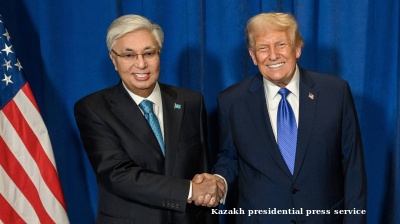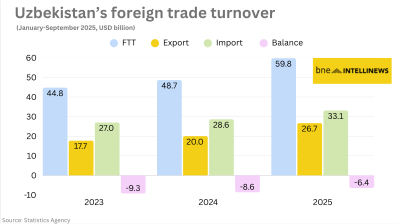Uzbekistan's new President Shavkat Mirziyoyev met his counterpart US President Donald Trump in Washington on May 16. The international media labelled meeting as a “historic” meeting, and accompanied it with numerous articles about Uzbekistan’s “miraculous” reforms and “soon to be democracy” coverage.
Indeed, it was the second ever visit of an Uzbek President to the United States in the country’s entire history. Sounds heroic. Less so when you consider there have only been two presidents of Uzbekistan since 1991, the year when country became independent from the Soviet Union. Mirziyoyev was elected as President in 2016 succeeding Islam Karimov who was the ruler of Uzbekistan more than 25 years and made that first trip to the United States in 2002.
But things have changed. During his first 18 months on the job Mirziyoyev has already been on 17 visits abroad, including three to Russia and one to China.
Another reason to sum up President Mirziyoyev’s visit to the United States as historic is the record number of agreements the Uzbeks signed with American counterparts worth a total of $6.5bn. The figure is impressive but with some caveats. Back in May 2017, exactly one year ago the president signed contracts worth $22bn with another counterpart – China. And a month before that he concluded the deals with his Russian colleague valued at $15.8bn.
Certainly, US–Uzbekistan relations are at a high. However, sometime ago the countries were even closer cooperating in defence during the US campaign in neighbouring Afghanistan, followed by a divorce after Karimov was heavily criticized for the massacre of several hundred of his own citizens in the city of AndiJanuary At that time. everyone thought country was back in the Russian military sphere of influence, but in 2012 Uzbekistan twisted again and withdrew from Russia led Collective Security Treaty Organization (CSTO) – the leading security agreement in Central Asia.
But it remains true that President Mirziyoyev’s visit to Washington marked a new phase in US-Uzbekistan military cooperation. “They also committed to pursue agreements that will enhance interoperability and improve regional security, and noted the importance of strengthening the defence relationship by implementing the first-ever Five-Year Plan of Military Cooperation,” the White House said in a press release.
The meeting didn't go unnoticed by Russia. Just four days after Mirziyoyev strengthened the US military relationships Russian Defence Minister Sergei Shoigu visited Tashkent where he pressed the importance of educating much more Uzbek officers in Russia and sending more Russian instructors to Uzbekistan.
Its obvious the new President is not going to change the country’s foreign policy or abandon its multi-polar goals any time soon – if ever. But changes will take time and so far Mirziyoyev has concentrated all his energy on the restoration of the good relations with Uzbekistan’s immediate neighbours.
Uzbekistan is one of only two double landlocked countries in a whole world. (The other one is Lichtenstein.) Having normal relations with the neighbours is simply existential for Uzbekistan’s economy and especially for a new leader who is poised to deliver the long waited growth and relative prosperity. Furthermore Uzbekistan is tightening its economic relations with China, though with some caution. Uzbeks need Chinese investment and to gain an access to it Uzbekistan needs active participation in the OBOR (One Belt One Road), that was difficult while quarrelling with all its surrounding countries. Because of its past isolationist policies Uzbekistan has already lost the first place to Kazakhstan in OBOR initiatives, while in the past the Silk Road passed through Uzbekistan’s splendid cities: Tashkent, Samarkand and Bukhara.
On the one hand official Tashkent is assuring its partners of its friendliness and the readiness to be a crossroad of Central Asia. On the other hand there are no signs the government is going to abandon its nationalistic paradigm, which is based on glorification of its warrior leaders, and first of all Tamerlane, the regional equivalent of Napoleon, a man who massacred and displaced thousands of people throughout Eurasia.
Another striking contrast is that there are only three countries among the post-soviet republics those maintained slightly modified Soviet era coat of arms and Uzbekistan is one of them -- together with Belarus and Tajikistan. At the same time Uzbekistan was one of the leading countries to rapidly erase its Soviet past by renaming the streets and displacing the heroes.
State symbol is not only evidence of country’s Soviet past. When one enters the government of Uzbekistan official webpage it lists down the government entities, which starts by regular Ministries and then it continues with the banks and the companies and so on. However it’s not as bad as it seems. There are three state banks in Uzbekistan but 27 banks in total. Uzbekistan has not privatized many state-owned companies thanks to the experience of other post-Soviet countries where privatization turned into the “Great Robbery” it might not be that bad a decision. Today the country has lots of untouched blue-chip companies that might attract direct investments when they are eventually put on the block.
During Mirziyoyev’s visit to Washington everyone acknowledged the success of Uzbekistan reforms. Indeed they are impressive. County liberalized trade, abolished import and investment control, currency exchange restrictions were lifted, and business regulation has been improved. Legislation keeps changing in favour of a business-friendly environment and overall the country is opening up to investors. All this was done in 12 months. That is a remarkable pace of change for any country and deserves rightful appreciation.
“Ongoing reforms under a new president, Shavkat Mirziyoyev, have led to improvements on some issues, but Uzbekistan remains a consolidated authoritarian regime. No genuine opposition parties operate legally, and domestic supporters of exiled opposition figures are persecuted. The legislature and judiciary effectively serve as instruments of the executive branch, and the media remain tightly controlled by the state. There is little accountability for endemic corruption or torture of detainees; despite some high-profile releases, the government still holds numerous prisoners on political or religious grounds.” This is the current description of the Uzbekistan in Freedom in the World 2018 Freedom House Index.
It is apparent Mirziyoyev acknowledges the necessity of the political reforms. His country development strategy 2017-2021 has prioritized: a) improving the system of state and public construction and b) ensuring the rule of law and further reforming the judicial system, while the economic and social reforms will follow afterwards. But the factual magnitude of economic reforms is impressive and visible while the political reforms are still limited.
Uzbekistan is very populous. Basically it is the most populous Central Asian country with 31mn people making up almost half the population of the entire. In addition its population is very young: 34% of its people are under 14 years old.
Sadly it does not lead regional charts in economy. Kazakhstan’s per citizen income is far higher (GDP per capita, current $7,714 - 2016), followed by Turkmenistan ($6,389) and Uzbekistan comes in third only ahead ($2,110.7) of Kyrgyzstan (1,077) and Tajikistan (795).
Uzbekistan income roughly equals of Moldova’s $1900 when unlike Moldova Uzbekistan is blessed with the natural resources. Uzbekistan has the fourth-largest gold mines in the world. It has significant deposits of copper and uranium too. The country is among the major producers of the natural gas and ranks eleventh in the world.
Uzbekistan has no right to be poor and underdeveloped. Furthermore, poverty is not only an economic issue but also a national security threat. With the large and young population bordering the Islamist militia states it risks to be drawn into the chaos or the worst kind of dictatorship unless it finds a ways to be wealthy and prosperous. But the wealth alone does not make people happy, they need a choice and liberty too. Does anyone think the current court system of Uzbekistan is sustainable? Uzbekistan has a zero per cent acquittal rate; even the Soviet Union had 10%.
Obviously, the new government must prioritize political reforms, but whom are the men and women in the government of Uzbekistan? Who are the reformers? Those who thought there are the young technocrats working in the new government will be disappointed. The median age of the relevant ministers is 56 and most of the cabinet members are in their 50s. Does anyone really believe a man in his 50s with the heavy legacy of Soviet authoritarianism and corruption on their shoulders can push for the Western-style reforms? And Mirziyoyev is no dissident from Karimov’s era; he is a long-serving former Prime Minister of Uzbekistan who is cleverly distancing himself from the past.
Above all, Uzbek management is very experienced. They perfectly feel and understand people want and deserve better lives. But it is obvious too the new president is not going to dismantle his throne any time soon. The ongoing reforms may serve to do little more than build up his power and transform Uzbekistan into thriving economy under the sharp eye and wise control of “Kurultai,” the political and military council of ancient Mongol and some Turkic chiefs and khans.
Opinion

COMMENT: Czechia economy powering ahead, Hungary’s economy stalls
Early third-quarter GDP figures from Central Europe point to a growing divergence between the region’s two largest economies outside Poland, with Czechia accelerating its recovery while Hungary continues to struggle.

COMMENT: EU's LNG import ban won’t break Russia, but it will render the sector’s further growth fiendishly hard
The European Union’s nineteenth sanctions package against Russia marks a pivotal escalation in the bloc’s energy strategy, which will impose a comprehensive ban on Russian LNG imports beginning January 1, 2027.

Western Balkan countries become emerging players in Europe’s defence efforts
The Western Balkans could play an increasingly important role in strengthening Europe’s security architecture, says a new report from the Carnegie Europe think-tank.

COMMENT: Sanctions on Rosneft and Lukoil are symbolic and won’t stop its oil exports
The Trump administration’s sanctions on Russian oil giants Rosneft and Lukoil, announced on October 22, may appear decisive at first glance, but they are not going to make a material difference to Russia’s export of oil, says Sergey Vakulenko.




